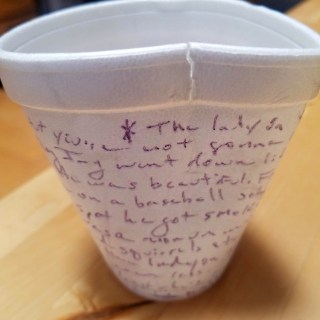
I have deleted CantoMundo from my main bio and in the future will not be including it in any of my bios because of the lack of action by the CantoMundo leadership regarding their initiatives regarding inclusion of Afro-Latinx voices.
I recognize the announcement CantoMundo made recently regarding Black Lives Matter and some of their action steps. I was also in a forum with other CantoMundistas giving feedback on that announcement. The actions detailed would be positive and necessary steps for Poets of Color in the United States and especially for Afro-Latinx writers.
I also feel that the statement in itself is just a starting point and that the follow up, if any, is happening in closed spaces. This act of centralizing power and a delay of action aligns more closely with practices of White Dominant Culture than CantoMundo’s statement of “latinidades in conversation with each other… representing diverse poetic styles and heritages.â€
I hope that CantoMundo, as an organization, strives to be more transparent and inclusive around their actions to support Black Lives Matter and other issues in solidarity with Black and Brown writers.
The issue of transparency and inclusion is the reason I am making this statement public. I believe deeply that writers of color have an important and necessary role in positive change making and shifts in public policy to better serve our communities of color. This change will not happen in silence or by simply deleting/muting/unfriending an account or contradictory opinion. Poets have power in their choice of words, venue, and affiliation. Just as we come to these spaces with intention to be heard, we should also come with the mandate to listen. Right now, I am not hearing very much from CantoMundo.
All poets are political. We are political by our noise and by our silence. I do not regard the label “political†as especially helpful in determining what is going to happen in the poems. When a poet writes racist poetry, she is being political. When a poet writes about trees, he is being political both by what he chooses to write about and what he chooses not to write about.
— Kwame Dawes
In 2010 I got word of an opportunity to attend a weekend-long workshop with MartÃn Espada in Albuquerque. I was excited for this chance to share space with one of my poetic heroes and inspirations. I was also eager to return to ‘Burque, the site of the 2005 National Poetry Slam, a place where I said goodbye to Slam Poetry in the presence of the Acentos, louderARTS, Bowery, Nuyorican, and a host of other members of the Slam family.
I applied and was accepted as one of the inaugural CantoMundo fellows. The course of that first weekend was exciting and also challenging as that same weekend, the killer of Oscar Grant was publicly exonerated and the streets of Oakland responded with anger. Righteous anger over the system letting the police kill Oscar Grant with no justice for the Grant family or for Black Oakland. The subsequent demonstrations across the United States and the spotlight of the medis did not change that outcome for the Grant family. I felt attached and detached from my community in Oakland but was thankful for the company of writers of color especially Latinx poetas.
From there I have made some enduring friendships thanks to CantoMundo. My third retreat coincided with the painful death of a Bronx poeta and I was held and supported by CantoMundistas. This is the solidarity and love that I will hold on to and share first and foremost when speaking of CantoMundo.
I want to thank Deborah Paradez and Celeste Guzman Mendoza as two of the founders of CantoMundo who always emanated a sense of compassion, integrity, and professionalism in every interaction I had with them. They both made me feel instantly at home even though I rarely feel welcome in spaces of competitive poetry even after being “accepted.†I will again emphasize their balance of holding both the relational and technical aspects of co-designing and implementing a poetry retreat. They both did so with a high level of grace, humor, and joy.
Deborah and Celeste were not the only organizers but they were the ones who spent the most time getting to know me as a person and hearing my warm/cool feedback on the retreats. Shouts and love to all other organizers and especially every poeta who I was able to laugh with and who shared their words with me.
My deepest hope is that CantoMundo can be a beacon of inclusivity for Afro-Latinx and all writers in Latinidad. I will support any public action that moves CantoMundo into a place of open words and shared dialogue pa todos.




